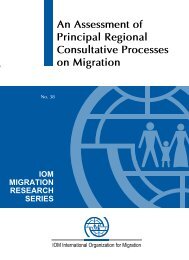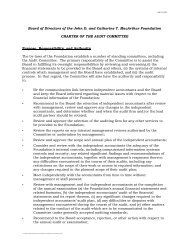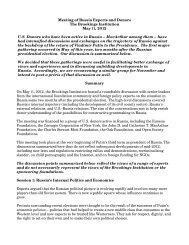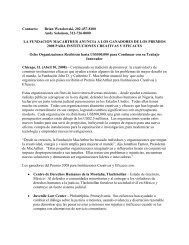A Global Compact on Learning - Brookings Institution
A Global Compact on Learning - Brookings Institution
A Global Compact on Learning - Brookings Institution
Create successful ePaper yourself
Turn your PDF publications into a flip-book with our unique Google optimized e-Paper software.
144<br />
R. Dumatog and D. Dekker, “First Language Educati<strong>on</strong> in Lubuagan, Northern Philippines,” Philippines, 2003; H. Pinnock, Language and Educati<strong>on</strong>:<br />
The Missing Link (L<strong>on</strong>d<strong>on</strong>: Save the Children, 2009).<br />
145<br />
Bialystok, Bilingualism in Development; J. Cummins, Language, Power, and Pedagogy: Bilingual Children in the Crossfire (Aberystwyth, UK: Cambrian<br />
Printers Ltd., 2000); K. King and A. Mackey, The Bilingual Edge: Why, When, and How to Teach Your Child a Sec<strong>on</strong>d Language (New York:<br />
HarperCollins, 2007).<br />
146<br />
C. Bens<strong>on</strong>, Girls, Educati<strong>on</strong>al Equity and Mother-T<strong>on</strong>gue-Based Teaching (Bangkok: UNESCO, 2005); S. Aikman and N. Rao, “Quality Educati<strong>on</strong><br />
for Gender Equality: Background Paper for the Quality Educati<strong>on</strong> Stream E4 C<strong>on</strong>ference,” paper presented at Quality Educati<strong>on</strong> Stream E4 C<strong>on</strong>ference,<br />
2010, http://www.e4c<strong>on</strong>ference.org/wp-c<strong>on</strong>tent/uploads/2010/04/17en.pdf.<br />
147<br />
K. Heugh, “Cost Implicati<strong>on</strong>s of the Provisi<strong>on</strong> of Mother T<strong>on</strong>gue and Str<strong>on</strong>g Bilingual Models of Educati<strong>on</strong> in Africa,” in Optimizing <strong>Learning</strong> and<br />
Educati<strong>on</strong> in Africa—the Language Factor: A Stock-taking Research <strong>on</strong> Mother T<strong>on</strong>gue and Bilingual Educati<strong>on</strong> in Sub-Saharan Africa (Tunis: Associati<strong>on</strong><br />
for the Development of Educati<strong>on</strong> in Africa, 2006), http://www.adeanet.org/adeaPortal/adea/downloadcenter/Ouga/B3_1_MTBLE_en.pdf;<br />
Bender et al., Evaluati<strong>on</strong> of the World Bank Assistance to Primary Educati<strong>on</strong> in Mali.<br />
148<br />
Lewis and Lockheed, Inexcusable Absence.<br />
149<br />
Heugh, “Cost Implicati<strong>on</strong>s.”<br />
150<br />
Bender email, May 12, 2011.<br />
151<br />
Ball email, February 13, 2011.<br />
152<br />
H. Pinnock, Steps Towards <strong>Learning</strong>: A Guide to Overcoming Language Barriers in Children’s Educati<strong>on</strong> (L<strong>on</strong>d<strong>on</strong>: Save the Children, 2009).<br />
153<br />
Ball, Enhancing <strong>Learning</strong>.<br />
154<br />
Room to Read website, retrieved February 22, 2011.<br />
155<br />
Pratham Books, Annual Report 2009 (Mumbai: Pratham, 2009).<br />
156<br />
See http://www.sil.org/literacy/materials/primers/primer_software.htm.<br />
157<br />
Relevant sec<strong>on</strong>dary school is defined as the practical knowledge, thinking and behavioral skills needed for a safe, healthy transiti<strong>on</strong> to adulthood<br />
and demanded by the labor market; World Bank, World Development Report 2007: Development and the Next Generati<strong>on</strong> (Washingt<strong>on</strong>: World<br />
Bank, 2007).<br />
158<br />
Psacharopoulos and Patrinos, Returns to Investment; K. Watkins, “When <strong>Learning</strong> Saves Lives: Educati<strong>on</strong> and Child Mortality,” World Educati<strong>on</strong><br />
Blog: Educati<strong>on</strong> for All <str<strong>on</strong>g>Global</str<strong>on</strong>g> M<strong>on</strong>itoring Report (Washingt<strong>on</strong>: World Bank, 2010); Rihani, Keeping the Promise; Lewis and Lockheed, Inexcusable<br />
Absence; Lloyd and Young, New Less<strong>on</strong>s; B. Herz and G. Sperling, What Works in Girls’ Educati<strong>on</strong>: Evidence and Policies from the Developing World<br />
(New York: Council <strong>on</strong> Foreign Relati<strong>on</strong>s, 2004); K. Subbarao and Laura Rainey, “Social Gains from Female Educati<strong>on</strong>,” Ec<strong>on</strong>omic Development<br />
and Cultural Change 44, no. 1 (1995).<br />
159<br />
Internati<strong>on</strong>al Labor Organizati<strong>on</strong>, <str<strong>on</strong>g>Global</str<strong>on</strong>g> Employment Trends for Youth (Geneva: Internati<strong>on</strong>al Labor Organizati<strong>on</strong>, 2010).<br />
160<br />
Post-primary educati<strong>on</strong> is defined as learning opportunities available for children and young people having completed primary school or the<br />
equivalent. It includes all forms of learning (formal and n<strong>on</strong>-formal), all modes of delivery (i.e., distance learning and apprenticeships), and all<br />
types of settings (community-based schools, work sites, etc.). W. Hoppers and S. Obeegadoo, “Bey<strong>on</strong>d Primary Educati<strong>on</strong>: Challenges and Approaches<br />
to Expanding <strong>Learning</strong> Opportunities in Africa,” in General Synthesis Report Presented at the ADEA 2008 Biennale <strong>on</strong> Educati<strong>on</strong> in Africa<br />
(Maputo: Associati<strong>on</strong> for the Development of Educati<strong>on</strong> in Africa, 2008).<br />
161<br />
UNESCO, EFA <str<strong>on</strong>g>Global</str<strong>on</strong>g> M<strong>on</strong>itoring Report 2011.<br />
162<br />
M<strong>on</strong>ica J. Grant and J. R. Berman, “Gender Gaps in Educati<strong>on</strong>al Attainment in Less Developed Countries,” Populati<strong>on</strong> and Development Review<br />
36, no. 1 (2010): 71–89, http://paa2008.princet<strong>on</strong>.edu/download.aspx?submissi<strong>on</strong>Id=80214; Lloyd and Young, New Less<strong>on</strong>s; UNESCO, EFA <str<strong>on</strong>g>Global</str<strong>on</strong>g><br />
M<strong>on</strong>itoring Report 2011.<br />
163<br />
UNESCO, EFA <str<strong>on</strong>g>Global</str<strong>on</strong>g> M<strong>on</strong>itoring Report 2011.<br />
164<br />
Associati<strong>on</strong> for the Development of Educati<strong>on</strong> in Africa, “Transiti<strong>on</strong> to Post-Primary Educati<strong>on</strong> with a Special Focus <strong>on</strong> Girls,” in Biennale <strong>on</strong><br />
Educati<strong>on</strong> in Africa (Maputo: UNICEF Eastern and Southern Africa Regi<strong>on</strong>al Office, 2008).<br />
165<br />
Lewin communicati<strong>on</strong>, March 25, 2011.<br />
166<br />
K. Lewin, Mapping the Missing Link Planning and Financing Sec<strong>on</strong>dary Educati<strong>on</strong> Development in Sub Saharan Africa. (Dakar: Sec<strong>on</strong>d Regi<strong>on</strong>al<br />
C<strong>on</strong>ference Sec<strong>on</strong>dary Educati<strong>on</strong> in Africa, June 6-9, 2009).<br />
167<br />
C. Beggs, Report to MacArthur Foundati<strong>on</strong>.<br />
168<br />
A. Verspoor, At the Crossroads: Choices for Sec<strong>on</strong>dary Educati<strong>on</strong> in Sub-Saharan Africa (Washingt<strong>on</strong>: World Bank, 2008).<br />
169<br />
Ibid.<br />
170<br />
Associati<strong>on</strong> for the Development of Educati<strong>on</strong> in Africa, “Transiti<strong>on</strong> to Post-Primary Educati<strong>on</strong>.”<br />
171<br />
Verspoor, At the Crossroads.<br />
172<br />
E. Kane, Girls’ Educati<strong>on</strong> in Africa: What Do We Know about Strategies That Work? Africa Regi<strong>on</strong> Human Development Working Paper 73 (Washingt<strong>on</strong>:<br />
World Bank, 2004).<br />
173<br />
Associati<strong>on</strong> for the Development of Educati<strong>on</strong> in Africa, “Transiti<strong>on</strong> to Post-Primary Educati<strong>on</strong>.”<br />
174<br />
UNESCO, EFA <str<strong>on</strong>g>Global</str<strong>on</strong>g> M<strong>on</strong>itoring Report 2010.<br />
A <str<strong>on</strong>g>Global</str<strong>on</strong>g> Compa c t <strong>on</strong> <strong>Learning</strong>: Taking Acti<strong>on</strong> <strong>on</strong> Educat i o n in Developing Countries<br />
C e n t e r for Universal Educat i o n at <strong>Brookings</strong><br />
60






